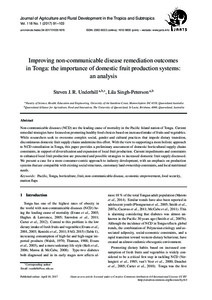Aufsatz

Improving non-communicable disease remediation outcomes in Tonga: the importance of domestic fruit production systems: an analysis
Zusammenfassung
Non-communicable diseases (NCD) are the leading cause of mortality in the Pacific Island nation of Tonga. Current remedial strategies have focused on promoting healthy food choices based on increased intake of fruits and vegetables. While researchers seek to overcome complex social, gender and cultural practices that impede dietary transition, discontinuous domestic fruit supply chains undermine this effort. With the view to supporting a more holistic approach to NCD remediation in Tonga, this paper provides a preliminary assessment of domestic horticultural supply chains constraints, in support of diversification and expansion of local fruit production. Current impediments and constraints to enhanced local fruit production are presented and possible strategies to increased domestic fruit supply discussed. We present a case for a more consumer-centric approach to industry development, with an emphasis on production systems that are compatible with existing social structures, customary land ownership constraints, and local nutritional needs.
Zitierform
In: Journal of Agriculture and Rural Development in the Tropics and Subtropics. Kassel : Kassel University Press. - Vol. 118, No. 1 (2017) S. 91-103Sammlung(en)
Vol 118, No 1 (2017) (Journal of Agriculture and Rural Development in the Tropics and Subtropics (JARTS))Zitieren
@article{urn:nbn:de:hebis:34-2017010351876,
author={Underhill, Steven J. R. and Singh-Peterson, Lila},
title={Improving non-communicable disease remediation outcomes in Tonga: the importance of domestic fruit production systems: an analysis},
year={2017}
}
0500 Oax 0501 Text $btxt$2rdacontent 0502 Computermedien $bc$2rdacarrier 1100 2017$n2017 1500 1/eng 2050 ##0##urn:nbn:de:hebis:34-2017010351876 3000 Underhill, Steven J. R. 3010 Singh-Peterson, Lila 4000 Improving non-communicable disease remediation outcomes in Tonga: the importance of domestic fruit production systems: an analysis / Underhill, Steven J. R. 4030 4060 Online-Ressource 4085 ##0##=u http://nbn-resolving.de/urn:nbn:de:hebis:34-2017010351876=x R 4204 \$dAufsatz 4170 7136 ##0##urn:nbn:de:hebis:34-2017010351876
<resource xsi:schemaLocation="http://datacite.org/schema/kernel-2.2 http://schema.datacite.org/meta/kernel-2.2/metadata.xsd"> 2017-04-20T07:59:00Z 2017-04-20T07:59:00Z 2017-04-18 1612-9830 2363-6033 urn:nbn:de:hebis:34-2017010351876 http://hdl.handle.net/123456789/2017010351876 eng Kassel University Press Urheberrechtlich geschützt https://rightsstatements.org/page/InC/1.0/ Pacific Tonga horticulture fruit non-communicable disease economic empowerment food security mutton flaps 630 Improving non-communicable disease remediation outcomes in Tonga: the importance of domestic fruit production systems: an analysis Aufsatz Non-communicable diseases (NCD) are the leading cause of mortality in the Pacific Island nation of Tonga. Current remedial strategies have focused on promoting healthy food choices based on increased intake of fruits and vegetables. While researchers seek to overcome complex social, gender and cultural practices that impede dietary transition, discontinuous domestic fruit supply chains undermine this effort. With the view to supporting a more holistic approach to NCD remediation in Tonga, this paper provides a preliminary assessment of domestic horticultural supply chains constraints, in support of diversification and expansion of local fruit production. Current impediments and constraints to enhanced local fruit production are presented and possible strategies to increased domestic fruit supply discussed. We present a case for a more consumer-centric approach to industry development, with an emphasis on production systems that are compatible with existing social structures, customary land ownership constraints, and local nutritional needs. open access In: Journal of Agriculture and Rural Development in the Tropics and Subtropics. Kassel : Kassel University Press. - Vol. 118, No. 1 (2017) S. 91-103 Underhill, Steven J. R. Singh-Peterson, Lila Gedruckte Ausg. im Verlag Kassel Univ. Press (www.upress.uni-kassel.de) erschienen. </resource>
Die folgenden Lizenzbestimmungen sind mit dieser Ressource verbunden:
Urheberrechtlich geschützt

